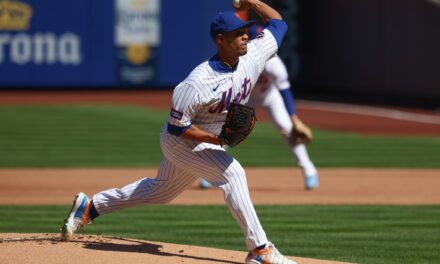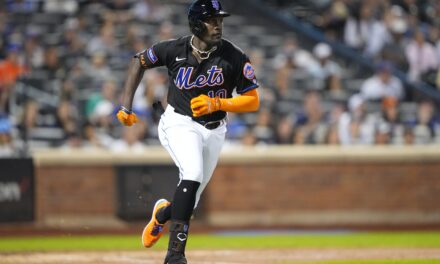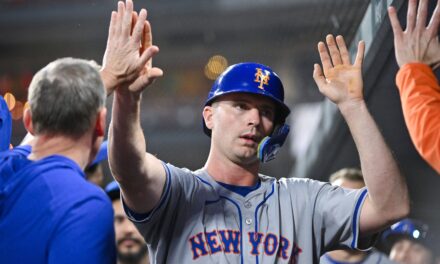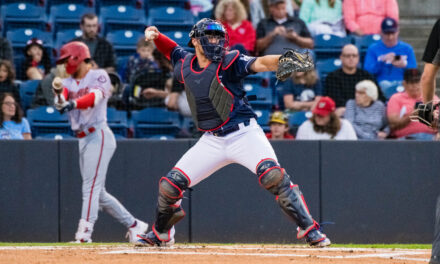
As the New York Mets’ pitchers and catchers (along with a number of position players) descend upon Port St. Lucie for spring training, baseball is officially in the air. With these sights and sounds of spring came something else we’ll get used to over the next few months: a press conference with manager Mickey Callaway.
The second-year skipper talked about a bunch of different topics in his first presser of the 2019 season, and there wasn’t much that was necessarily earth-shattering news. We already knew Jeff McNeil would be in the outfield a lot, Jason Vargas is anticipated to be the fifth starter, and that it’s anyone’s guess as to what we can expect from Yoenis Cespedes.
What was most interesting to me, though, was hearing Callaway talk about what he learned from 2018, seeking feedback, and the ensuing expectations he’ll be dealing with moving forward. Within everything he said, it was hard to ignore how he’s received both more support and more pressure as he prepares for another season with New York.
More Support
Compared to his rookie campaign at the helm, Callaway’s roster and support system — both in the dugout and up in the front office — have changed quite a bit.
While there are a number of people who would likely argue that Brodie Van Wagenen still has work to do, a ton of roster turnover happened. With that turnover brought a revamped back end of the bullpen in Edwin Diaz and Jeurys Familia, more proven offense from Robinson Cano, Jed Lowrie, and Wilson Ramos, along with some adequate depth in players like J.D. Davis and Keon Broxton, among other things. When the injury bug hits New York — and it always seems to hit forcefully — the organization looks to be in better position to withstand being shorthanded than in years past.
Behind BVW’s leadership is also a growing analytics team, which is something we weren’t sure was going to happen based off a number of reports last summer. Having this particular department will provide Callaway with more data in order to properly prepare and make more informed decisions (one would hope).
Lastly, Callaway spent quite a bit of time on Wednesday talking about new bench coach, Jim Riggleman, who brings a wealth of baseball — and more specifically, National League — knowledge with him to Queens. He brings that “traditional” style to the dugout, which will help balance out the increase in analytics that will undoubtedly be available.
Riggleman’s outlook on managing a game will come in handy when Callaway tries to overthink situations, or make things more complicated than they should be.

More Pressure
The duties of being a big-league manager automatically brings an inherent amount of pressure, but it feels like more in some situations than others. It’s definitely more in Callaway’s case, and that’s not even considering his individual circumstances. Managing in New York — the game’s biggest media market — means he’ll continue to be under intense scrutiny for just about everything he does.
He’s also dealing with the pressure of not having the general manager that hired him still be in charge. Sure, BVW has publicly stated his confidence in the Mets’ current skipper, and Callaway never seemed to be in real danger once Van Wagenen took over the front office. For a guy who wasted no time putting his mark on this team, though, one has to imagine he’d have no problem doing the same thing at manager.
While the roster moves speak for themselves, Van Wagenen has consistently said he feels the Mets are a playoff team. In fact, he’s said it so much and so emphatically that it’d end up being quite a disappointment if New York didn’t qualify for some October baseball. And even if the Mets get off to a good start in April, there will be pressure on Callaway to make sure things don’t spiral out of control…again.
Having such a deep roster on the position player side is a blessing, but it can also be a source of headaches as Callaway tries to ensure his players stay as fresh and as sharp as possible. Riggleman’s presence will help him on a day-to-day and even play-to-play basis, but it’s been well established that he could take over at any moment. The 66-year-old has had experience taking charge as an interim manager in the past, with it happening most recently with the Cincinnati Reds in 2018.
So, although Callaway has more support and resources in order to succeed than he did last year, there are as many reasons (if not more) to also feel the pressure to perform.














